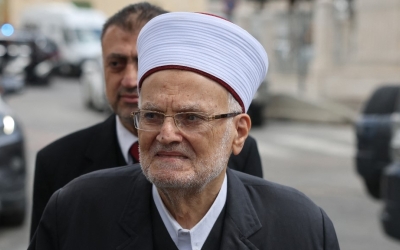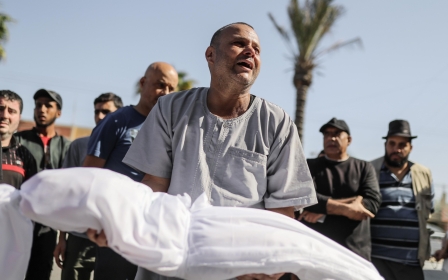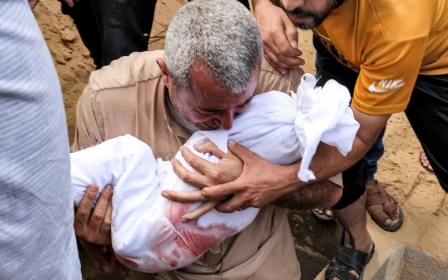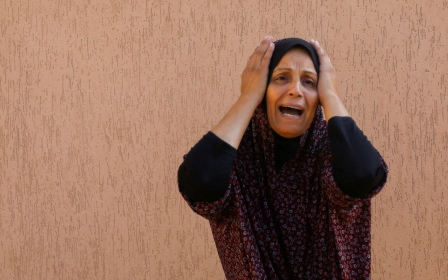Israel-Palestine war: Chaos and horror inside Gaza's hospitals as bodies litter the floors
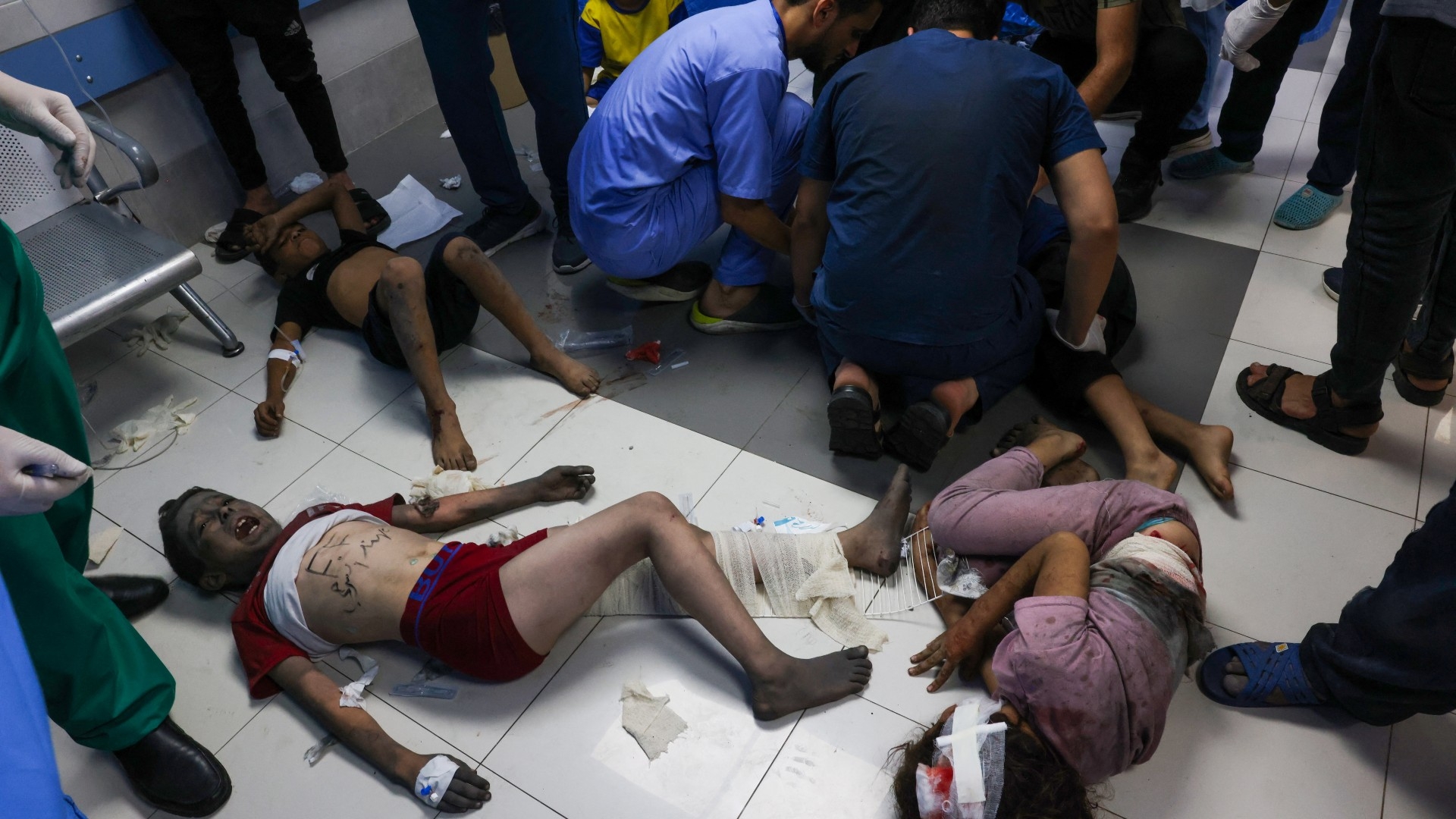
The corridors may be dimly lit, but the devastation that has engulfed Gaza's Dar al-Shifa hospital is on full display for the newly arriving wounded to see.
Groans and screams of pain ring out from different sides of the emergency room, as doctors try to navigate through a sea of injured Palestinians being treated on the floors.
'Medical staff are treating the injured on the ground. Literally on the ground'
- Malak Naim, GP
Hospital workers grab mops and start to clean the blood-stained tiles between the wounded, as the strong smell of chlorine wafts through the air.
We're only on day nine of Israel's latest round of air strikes on the besieged Gaza Strip, but the sheer scale of the devastation has aready pushed this war-battered facility to breaking point.
Walaa Alabasi, who could be see anxiously standing against a wall, told Middle East Eye that she was waiting to hear news of her 21-year-old brother, Salem.
New MEE newsletter: Jerusalem Dispatch
Sign up to get the latest insights and analysis on Israel-Palestine, alongside Turkey Unpacked and other MEE newsletters
Shrapnel from an Israeli air strike hit him in his arm as they fled their home earlier this week, severing a tendon and leading to an immediate loss of motion which required surgery.
"Although he needed surgery, doctors only cleaned [the area] and put a bandage on his injury, telling him to come back after six days," Alabasi told MEE.
"The hospital's operating rooms were overwhelmed by hundreds of critical surgeries. [Can you] imagine leaving a hospital with shrapnel in your wrist as you can't get a turn for a surgery?"
'No water in toilets'
More than a week after Palestinian fighters breached Israel's highly fortified separation barrier and killed more than 1,300 Israelis, Israel is preparing for a possible ground invasion of Gaza for the first time in nearly a decade.
A ground offensive would probably drive up the Palestinian death toll, which already has outpaced the past four wars in the besieged enclave.
Follow Middle East Eye's live coverage for the latest on the Israel-Palestine war
But with Gaza's hospitals poorly supplied at the best of times, fears are growing that Israel's decision to sever food, fuel, water and electricity from entering the enclave of more than two million people could cause the civilian death toll to spike.
Rights groups have warned that the decision to impose a complete siege on Gaza, on top of the siege that has existed since 2007, constitutes collective punishment and is a violation of international law.
Current and former staff at the Shifa hospital told MEE that they were desperately trying to save whatever diesel remained in their back-up generators, and were turning off lights in all non-essential departments.
"Yesterday I talked to my colleagues at the Shifa hospital and they told me that they still don't have enough beds for the wounded, and medical staff are treating the injured on the ground. Literally on the ground," Malak Naim, a GP who previously worked at the Shifa hospital, told MEE.
"They also told me they don't have basic necessities like water in toilets," said Naim.
"The operating rooms and medical staff work round the clock under incredibly challenging conditions. They only sleep for a few hours if they are lucky to find a bed, and then they go back to work."
On Thursday, the Israeli army ordered around 1.1 million Palestinians in north Gaza to head south and offered no guarantee of their return.
Since issuing the order, many of the Palestinians who fled have found no reprieve from Israel's bombardment, with war planes striking convoys and roads used as escape routes.
Situation is dire
Amid the heavy bombing, a new wave of patients streamed into Al-Durrah hospital for children on Thursday, babies and toddlers with bruises and bandages and young children with blood caked on their faces.
Israeli air strikes killed at least 250 people that morning, including 44 members of the same family in Jabalia.
Gaza's Ministry of Health said in a statement that the Durrah hospital was not spared from the bombardment and was forced to evacuate after it was targeted by white phosphorus rounds.
MEE could not independently verify the report, but Human Rights Watch has said that Israel is using white phosphorous "unlawfully" in the Gaza Strip.
Since Israel issued its order for Palestinians to leave northern Gaza, several hospitals have reported that they can't eject patients who are in urgent need of life-saving assistance.
The Al-Awda hospital issued an international appeal on Saturday saying it couldn't turn away wounded Palestinians or shut its doors.
"The wards are full of injured people. We appeal to our humanitarian partners around the world to put pressure on Israel," the hospital said in a Facebook post.
Health authorities have since accused Israel of deliberately bombing ambulances, breaching international rules that catalogue such attacks as war crimes.
The Palestine Red Crescent Society has condemned "the intentional targeting of medical teams", which killed "four paramedics in less than half-an-hour today, despite prior coordination".
For now, staff at the Shifa hospital said the situation at its morgue was also a top priority after it reached capacity days ago and began overflowing.
Staff said they were forced to stack corpses three high outside the walk-in cooler and put dozens more, side by side, in the parking lot.
"The staff are under huge pressure," Naim said.
"Many of their families have fled south while they continue to work [under such horrible conditions]. The situation is dire."
Middle East Eye delivers independent and unrivalled coverage and analysis of the Middle East, North Africa and beyond. To learn more about republishing this content and the associated fees, please fill out this form. More about MEE can be found here.


